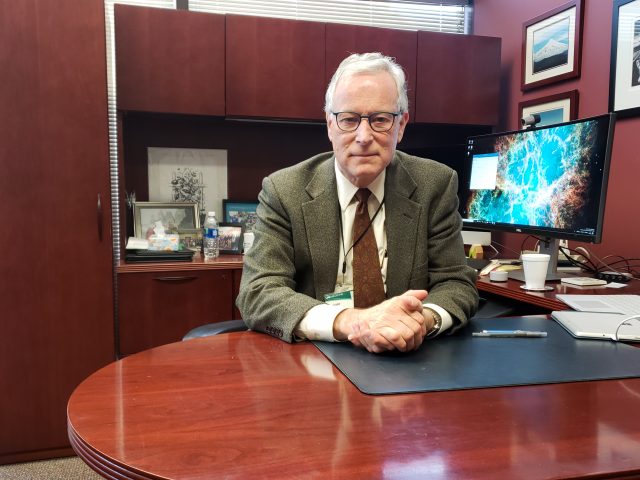Solomon Crenshaw Jr.
For The Birmingham Times
The goal of the All of Us Research Program is to help researchers understand more about why people get sick or stay healthy. People who join give information about their health, habits and what it’s like where they live. By looking for patterns, researchers may learn more about what affects people’s health.
Dr. Bruce Korf is the associate dean for Genomic Medicine, the Wayne H. and Sara Crews Finley Endowed Chair in Medical Genetics, and chief genomics officer of UAB Medicine. He is also the contact principal investigator for the All of Us Southern Network, which includes UAB.
Here, Dr. Korf discusses the program.
What is genomics – how is it different from genetics?
“Genomics is the study of the entire complement of genetic information in all of ourselves, any individual gene. Something like 22,000 of them can be studied [from blood samples] in terms of the way information in that gene is passed from generation to generation and how it works in the cell. But one gene at a time would take us forever to really get a complete picture of the entire interplay of all the genetic information with the environment and other factors. Genomics allows us to study the entire complement of genetic information all at once. We can, for example, sequence all 22,000 genes in less time now than it used to take us to study just one gene. A good way to think about this is to conceptualize books in the library. I think of any individual book as similar to a gene. It tells a particular story. The genome is like the library, a collection of all the books. Now we have the ability, in a way, to read the content of all the books all at once, which is a remarkable achievement in genetics.”
How is genomics incorporated into the All of Us Research Program?
“As of now, all of the participants are being consented to participate in the genomics component of the project. The plan is ultimately to perform whole genome sequencing on all of those individuals who give consent and also genotyping. The difference is whole genome sequencing literally looks at the entire genome, more or less every element of the genome. Those elements are the letters of the genetic code on a DNA basis. We have about two copies of something over three billion of those in our genome. So genome sequencing will look at essentially the whole thing. In addition, there’ll be genotyping. That number is somewhere close to a million individual genetic variants. It can be done very quickly and inexpensively, but it leaves out a lot. These are like signposts on the road in the genome, and they give you a rough idea of where you are. But they don’t give a lot of detail as you might get if you were to take a moving picture looking out the car window and seeing the entire road trip. Both of those are now being done.
“We’ve been recruiting for All of Us for a couple of years now and the genomics is really just getting underway. We have to re-consent everybody [for genomics only] who previously consented. Of course, anybody who consents from here forward will be asked to consent to genomic studies as well. It’ll take us a good bit of time to catch up and do the genotyping and sequencing on all people who were previously enrolled, and now have been re-consented to have the genomics done. This is not going to happen overnight. But it is now happening.”
Why do researchers value genomics research and results?
“The genome is really the set of instructions for basically how to put cells together. They have a tremendous influence on our health, including risk of disease and how we respond to particular treatments. Being able to decipher the genome, we think, will give us a lot of insight into individual risks of disease, and overall health status. Now we don’t mean to imply that the genome by itself is sufficient to explain health and disease. We recognize that there are many other factors especially environmental exposures, for example, that also have an influence on these. But studying the genome is going to give us a tremendous amount of information that will contribute towards personalized healthcare.”
Is every participant in the All of Us Research Program eligible to consent to the genomic portion of the program?
“Yes, everybody who has enrolled in the program is eligible to consent. The process is a little different for people who might consent, let’s say, tomorrow. The genomic consent will be embedded in their consent process. People who have consented previously before the genomics were up and running will have to be re-consented to participate in genomics. But now everybody that’s enrolled in All of Us will have the opportunity to provide their consent.”
How long does it take to test someone’s DNA and receive results?
“Well, because we have something over a quarter million people enrolled already and gradually they’re being re-consented for genomics, the labs are going to take some time to get all the genomic studies done on that large number of people. Although the actual process . . . will probably (take) a matter of weeks, it is much more likely to be months to a little over a year before they catch up. It’s sort of like climbing a mountain here, trying to get through all the genomic studies that need to be done . . . Eventually it will be done but it’s going to take some time. Nobody should expect results overnight certainly or even in a matter of weeks to a few months. It could take a while given the backlog.”
Is the genomics component of All of Us new to the overall program?
“It is new in the sense that the facilities to do the sequencing, and the follow up genetic counseling, took time to get in place. Once the providers of those services were identified, they had a lot of work to do to get that fully operational. Meanwhile, enrollments were taking place all along. It was recognized that we would need to go back and sort of re-consent people once we were ready. But to do the genomics well takes a lot of time in preparation. It’s been done very thoughtfully and carefully and, as a consequence, it’s taken a while to get it to the point where it was ready. In the meantime, other aspects of the program moved forward so we always knew genomics would be an important part of All of Us. It’s just taken a while to get it to the point where we knew that it was ready to be done on a routine basis.”
What could someone learn from their DNA results and what are the limitations?
“There will be returning genetic information about how your body interacts with various drugs. There are medications that genetic factors are involved in either activating the drug so that it can work in the body or in activating it so it can be removed from the body. These genetic variants, if you know what they are in a given person, can help you to customize the choice of medication or the dosage of medication to maximize benefit and to avoid side effects. Those are the kind of things that a person can learn about themselves.
“Now as far as the limitations are concerned, there’s a few things to realize. The first is this should not be viewed as clinical genetic testing. This is being done on a research basis so the many safeguards that are in place in terms of clinical genetic testing are not part of this program. It’s recommended these not be used for clinical decision making, although it might prompt you to get a clinical genetic test if you have [a result] that’s significant.
“Secondly, the testing involved is only looking at a very restricted set of genes. Most people are not going to have an actionable medical variant. We estimate maybe upwards of 3 percent will, but that means 97 percent won’t. For example, if you consider breast and ovarian cancer where a family history of either of those could indicate genetic risk, if your test is negative, you need to realize that the testing is not done with the same kind of thoroughness in a set of genes that a clinical test would have been. You shouldn’t assume that you are not at risk of breast and ovarian cancer or for the other genes like colon cancer. It doesn’t mean that you couldn’t get these things; it just means that the variants they were looking for, were not found in you. So it definitely should not be used as a substitute for a clinical test if you have a personal or family history of any of these problems. We don’t want to falsely reassure people that they think that they have a clean bill of health, realizing this was a test on a research basis. It isn’t the same as a clinical test.
“On the other side of the coin, we want people to realize that if they have a positive result meaning a variant is found that indicates risk of disease, risk of disease does not equate to having disease. If you, for example, have a variant that increases your risk of colon cancer, that doesn’t mean you have colon cancer and doesn’t even mean you’ll ever develop it. It just means your risk is higher than the general population and it’s recommended that you’d be followed to detect it if it’s present, and hopefully detected early. But many people with these variants are going to turn out to not have the disease in question, at least not now. And it could be a long time, if ever, before they develop it so risk doesn’t equate to diagnosis. Those are some of the limitations.”




